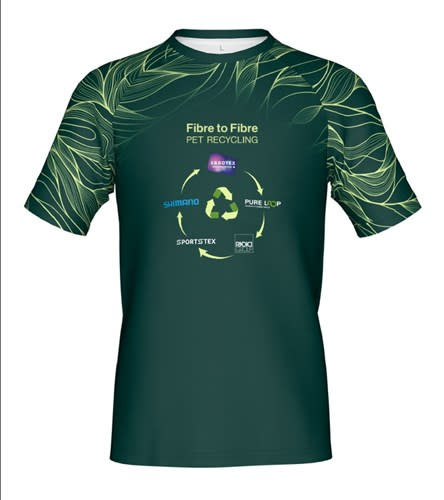R&D Initiative Led by RadiciGroup Recycles Polyester for Sports Jerseys

A European R&D initiative led by RadiciGroup, manufacturer of specialty chemicals and textile products including nylon and polyester yarns, recycled and bio yarns, non-wovens and PPE, and sportswear producer Sportstex takes aim at recycling polyester.
Sportstex got the idea to recycle the materials that go into the soccer, volleyball and other sports jerseys it produces, in collaboration with Pure Loop, a company specialized in the machinery to do it.
More from Sourcing Journal
The R&D teams from all three companies conducted a series of experiments using different percentages of granules from recycled plastic bottles mixed with polyester granules derived from recycled fabric. Experimenting with the formula they were able to fine-tune it until they came up with a high-tech yarn that was 100 percent derived from textile waste.
The recycled polyester can be made into garments that can be recycled multiple times over the course of a lifetime, making it a closed loop. Erdotex, which specializes in sorting used garments, has devised a way to sort the jerseys and has plans to scale it up to an industrial level. Cycle gear and fishing tackle producer Shimano has already gotten on board with plans to make and market cycling jerseys from the new material. A jersey produced using this new recycling process was on display at ITMA in Milan earlier this month.
“Achieving increasingly sustainable textiles is at the heart of the strategy of Radici InNova, the RadiciGroup company focused on innovation for circularity,” said Gianni Todaro, R&D specialist, apparel and technical, RadiciGroup Advanced Textile Solutions. “For some time now, we have been designing innovative solutions with high technical performance that respect the environment, working in synergy with our customers and suppliers and sharing our knowledge in the recovery of textile waste.”

“Recycling has an enormous potential in the fiber and textile sectors, and I’m sure it will become a standard feature in the industry in the future,” said Merlijn van Essen, sales manager at Pure Loop. “That’s why I am very pleased this pilot project, initiated by RadiciGroup, sees us taking an important step towards more sustainable production of fibers and textiles.”
Polyester makes up 54 percent of all textiles globally, according to Statista’s 2021 figures released last year. While it is harmful to the environment, the recycled version is less so. Recycled polyester uses 59 percent less energy to process and weave than virgin polyester, and 32 percent less CO2.
Other fibers in the mix include cotton, 22 percent of all textiles, manmade cellulosic fibers, 6 percent, and natural plant-based fibers, 6 percent, with the rest divided among animal fur, polyamide and other synthetics.
It is likely the environmental advantages that are driving chemical companies’ and manufacturers’ interest in getting into recycled polyester, as well as the goal of circularity. Among the companies beginning to get involved is Lenzing in Austria, which has developed a process using its Refiber technology to transform complex colored textiles made from cotton, polyester and elastane, into something that can be processed and recycled. Eastman Chemical has invested millions in recycling plants over the past few years, and L.A. materials science innovator and Cycora producer Ambercycle is working with Taiwan’s Shinkong Synthetics to develop textile recycling solutions that will likewise reduce the need for virgin materials.
Brands, meanwhile, are also jumping on the bandwagon of recycled textiles. Next Level Apparel has transitioned an entire line of poly blended fabrics to recycled fabrics, Quicksilver is making board shorts from recycled polyester twill and Zara has launched a recycled poly-cotton blend line of fast fashion.

